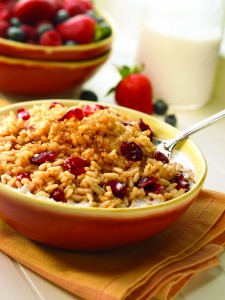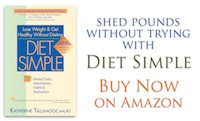Busted! Weight Loss Supplement Companies Sued for Diet Scams
- At January 12, 2014
- By Katherine
- In Articles, News
 1
1
Want thinner thighs by applying an almond-scented cream? How about eating all you want, yet losing weight by adding a powder to your food? Safe pills which cause weight loss?
Sounds good to me, too! But…
The weight loss industry is exploding with consumers spending $66 billion on weight loss products. Taking advantage of America’s obesity epidemic with false promises and lose-weight-quick schemes, supplement companies are raking in the dollars. I mean, who doesn’t want to lose weight with no effort? Watch my CNN interview on The Situation Room with Wolf Blitzer for the whole story…
Katherine on CNN & Radio MD: Best Snacks & Lunches
- At September 03, 2013
- By Katherine
- In News
 0
0
Snacking is an area where many people drop the ball when it comes to healthy eating. But snacking doesn’t have to be all bad. In summertime, you are probably more conscious of your caloric intake – especially if your summer activities include wearing a bathing suit. The trick is to change your snacking habits and control your options any time of the year. Yes! You can allow yourself guilt-free snacks that do not cancel out your typical dietary regimen.
On CNN and on Radio MD’s Staying Well with Melanie Cole, Katherine shares the best snacks and lunches that will help you maintain your health and weight loss goals.
CNN Report Follow-up: Katherine Explains GMOs
- At July 08, 2013
- By Katherine
- In Articles, News
 2
2
Genetically Modified Foods: Part II
Your responses to my recent CNN interview were PASSIONATE – on both sides of the issue – regarding GMO’s health and environmental benefits.
Genetically modified organisms (GMOs) continue to spark passionate debate: Emotions run high regarding studies of the impacts of GMOs on health and the environment.
I was interviewed about GMOs by CNN’s “The Situation Room with Wolf Blitzer” which recently reported that Chipotle and many restaurants and food companies in the United States use GMOs. Though Chipotle is one of the few that voluntarily discloses its ingredients.
It’s important to note that scientists in general regard a GMO food nutritionally equivalent to a non-GMO food.
The U.S. government’s stance
GMOs are not allowed in any food certified as organic by the U.S. Department of Agriculture (USDA). However, in an online food Q&A, the U.S. Food and Drug Administration (FDA) stated that GMOs have been in the U.S. food supply for about 20 years. The agency also stated in a consumer update that “Foods from genetically engineered plants must meet the same requirements, including safety requirements, as foods from traditionally bred plants.” Such foods, the FDA added, “are generally as nutritious as foods from comparable traditionally bred plants… [They] have not been more likely to cause an allergic or toxic reaction than foods from traditionally bred plants.”
Additionally, Michael Jacobson, executive director of the Center for Science in the Public Interest, said there is no safety hazard in using genetically modified soybean oil over conventional soybean oil — a finding the respected organization highlighted recently in its Nutrition Action newsletter.
Hence, the federal government does not require that GMO or non-GMO foods be labeled.
“Food manufacturers may indicate, through voluntary labeling, whether foods have or have not been developed through genetic engineering, provided that such labeling is truthful and not misleading,” the agency stated. “FDA supports voluntary labeling that provides consumers with this information.”
Yes, the GMO debate is still heated and in full swing. There are pros to GM foods —increased yield in staple crops can help to combat world hunger, for example. (Viggy Parr contributed to this report)
Are Genetically Modified Foods Safe?
- At June 19, 2013
- By Katherine
- In Articles, News
 0
0
CNN’s “Situation Room with Wolf Blitzer” reported… that Chipotle Fast Food Restaurants have disclosed (good for them!) they are using some genetically modified foods
Katherine was interviewed recently for the report.
Genetically Modified Organisms: The GMO – in this case a food’s – genetic material has been altered, much like plant breeding, which has been going on for thousands of years. Nutrition and food scientists agree that a GMO food is safe and nutritionally equivalent to a non-GMO food. In fact, some foods have been altered to improve nutrition for undernourished people with great success. An example is Harvest Plus, an organization that has developed iron, zinc and vitamin A fortified seeds for farmers in underdeveloped countries like India.
Sustainable Farming: Farming which has a future, where soil, water, and the environment are protected for future generations.
Local/Seasonal: The movement which promotes eating foods grown locally and in season; when food is picked at peak ripeness for maximum nutrition, flavor, environmental protection, and sustainability. For CNN’s report (and Katherine’s article) on Farmers Markets and how they save your health and the environment…
Omega-6-Fatty Acids, high in soybean oil, compete with Omega-3-Fatty Acids in your body. If omega-6-fatty acid intake is too high in comparison to omega-3’s, this leads to increases in inflammation, a leading risk factor for many diseases including heart disease, cancer, etc. For details…
On CNN: An Egg-A-Day Does Not Increase Heart Disease or High Blood Pressure Risk (Breakthrough Study)
- At February 01, 2013
- By Katherine
- In Articles, News
 0
0
My clients regularly ask me, “Should I be eating eggs? My doctor tells me they’re ‘poison,’ and to avoid eggs because they’ll increase my cholesterol.”
My response? “That’s OLD NEWS!” Read the updated scientific reports on eggs and find out why…
Most of the studies I’ve seen conclude that eggs are fine, I’ve reported in “7 Bad Foods That Are Good for You” in The Washington Post & “Eggs Don’t Deserve Their Bad Reputation, Studies Show” in LiveScience.com’s Expert Voices Op-Ed — and may even improve your health, as they contain nutrients difficult to find in other foods (see below). More importantly, a report by Ying Rong of Huazhong University of Science and Technology and her colleagues published in the British Journal of Medicine in January, reviewed 17 different egg studies.
The study concluded, “Higher consumption of eggs (up to one egg per day) is not associated with increased risk of coronary heart disease or stroke. The increased risk of coronary heart disease among diabetic patients and reduced risk of hemorrhagic stroke associated with higher egg consumption in subgroup analyses warrant further studies.”
The bottom line: Your nutritional needs and food choices should be personalized. You should enjoy food and eating, as it is one of the basic pleasures in life!
The much-maligned egg deserves more respect
My grandmother’s favorite food in the whole wide world was eggs (see recipe below). She loved eggs so much, we named an egg cooking style after her. The “grandmommy egg” was soft-boiled for three minutes. As it sat in an egg cup, we would slice off the top third so the runny yolk would form a delicious and naturally creamy sauce for the white.
Unfortunately, during the last decades of her life, my grandmother came to see eggs as poison and avoided one of her real food pleasures. Health authorities were warning the public against eating eggs for fear that they were a major cause of high cholesterol levels — the bad kind, low-density lipoprotein, known as LDL — and increased risk of heart disease.
New studies show that the caution may have been an exaggeration.
Yes, increased blood cholesterol levels can raise the risk of heart disease. Eggs are high in dietary cholesterol. But does eating eggs raise blood cholesterol and cause heart disease? This is where the story gets somewhat complicated, so stay with me, folks, and I’ll try to make sense of all of this.
First, the research
Most epidemiological research — the kind of research that studies large populations over time and analyzes their diets and their health — has found no connection between eating eggs and increases in heart disease. On the other hand, controlled clinical studies — where researchers feed subjects specific amounts of cholesterol and measure the effect on blood — do show a slight increase in blood cholesterol with increases in dietary cholesterol, though how much depends on genetic factors.
Cholesterol is an important component of all human and animal cells and influences hormone biology, among other functions. Since your body naturally has all it needs from producing its own cholesterol, there is no dietary requirement for more cholesterol. But the American diet contains plenty, since we eat a lot of animal products. All animal products contain some cholesterol, but they also contain saturated fat, an even more significant culprit in heart-disease risk.
“The major determinant of plasma LDL level is saturated fat,“said Alice Lichtenstein, professor of nutrition science and policy at the Friedman School of Nutrition Science and Policy at Tufts University.
And while eggs are high in cholesterol (186 milligrams, 184 of them in the yolk), they’re relatively low in saturated fat (1.6 grams in the yolk).
“In most people, for every 100 milligrams reduction in dietary cholesterol, one would predict a reduction in LDL levels of 2.2 points on average,“said Wanda Howell, professor of nutritional sciences at the University of Arizona.
In fact, during my 20 years of counseling people with high cholesterol, just reducing their saturated fat intake to a range of 4 percent to 7 percent of their calories, causes their blood cholesterol levels to plummet (I usually recommend 4% if you need a dramatic reduction in LDL cholesterol) — a double benefit.
Interestingly, people in Japan — consumers of some of the largest quantities of eggs in the world (averaging 328 eggs consumed per person per year — have low levels of cholesterol and heart disease compared with other developed countries, especially the United States. Why? In part, it‘s because the Japanese eat a diet low in saturated fat.
Americans do just the opposite. Research has shown that we usually have our eggs alongside foods high in saturated fat, such as bacon, sausage and buttered toast. This meal pattern raises LDL levels and makes the effect of eating eggs worse than it actually is.
So how many eggs can you eat? That depends on a number of factors. The American Heart Association no longer includes limits on the number of egg yolks you can eat, but it recommends that you limit your cholesterol intake to 300 milligrams daily, or 200 milligrams if you have heart disease or if your LDL is greater than 100. You decide where that cholesterol comes from!
Other experts go further and say an egg a day is fine.
“The amount that one egg a day raises cholesterol in the blood is extremely small, so small in fact that the increase in risk in heart disease related to this change in serum cholesterol could never be detected in any kind of study,“ said Walter Willett, professor of epidemiology and nutrition at Harvard’s School of Public Health.“Elevations in LDL of this small magnitude could easily be countered by other healthy aspects of eggs.“
Based on the research, my recommendation is if you eat a healthful diet, go ahead and eat an egg a day, says Katherine on CNN. On the other hand, if your cholesterol is high and if you eat the typical American diet — high in saturated fat, devoid of fruits, vegetables and fiber — maybe you shouldn’t be eating an egg a day.
But will taking eggs out of an unhealthy diet make a positive difference? Probably not. I can‘t tell you how many times during my career I‘ve heard people say, “I‘ve cut out eggs, but my cholesterol is still high!“The impact of a healthy, balanced diet cannot be denied here.
Good for you
Assuming you’re eating a healthy diet, here are some ways you may benefit by eating eggs.
Protein. Eggs are considered the gold standard that other proteins are measured against. Because of the superior amino acid mix, an egg’s six grams of protein are absorbed easily and efficiently used by the body. The egg is also low-calorie (74 calories).
Choline. Yolks are one of the best sources of this essential nutrient. Choline is needed for brain development in a growing fetus and may also be important for brain function in adults.
Lutein and Zeaxanthin. These two, important, beneficial phytochemicals found in egg yolks (as well as kale and spinach) help prevent eye diseases, especially cataracts and age-related macular degeneration. While eggs contain less lutein and zeaxanthin than greens, these phytochemicals are more absorbable because of the presence of fat in the yolk.
Vitamin D. Eggs are one of the few natural sources of Vitamin D, important for the bones and teeth. Vitamin D aids the absorption of calcium, which is important for the heart and colon, as well.
To bring this all together, here is a recipe that is a regular meal for me any time of the day — quick, easy, delicious, nutritious!
Eggs Scrambled with Onion, Garlic and Sweet Cherry Tomatoes
Servings: 1
Sauté 1/4 sweet onion and a smashed garlic clove over medium-high heat in 1 teaspoon canola or olive oil until almost soft. Add a handful of chopped tomatoes to the pan (or any other vegetables you happen to have, such as chopped spinach, kale, mushrooms or peppers) and cook for another 5 minutes. Turn down the heat to very low. In a separate bowl, whisk two eggs. Pour eggs into the pan containing the onion, garlic and tomato — add 1 ounce low-fat cheese, if you wish. Stir continuously until eggs are cooked. Pour over toasted, whole rye bread.
The Study: British Medical Journal 2013; 346 doi: http://dx.doi.org/10.1136/bmj.e8539 (Published 7 January 2013)
Study Conclusions: “Higher consumption of eggs (up to one egg per day) is not associated with increased risk of coronary heart disease or stroke. The increased risk of coronary heart disease among diabetic patients and reduced risk of hemorrhagic stroke associated with higher egg consumption in subgroup analyses warrant further studies.”
Bottom Line: “Your nutritional needs and food choices should be personalized. You should enjoy food and eating, as it is one of the basic pleasures in life!”
Eating to Save the Planet
- At May 14, 2012
- By Katherine
- In Articles, News
 3
3
Katherine explaining “Farmers Markets: Good For You, Good For The Environment” Watch on CNN
For those of you who want to make a contribution toward saving the planet, you may want to consider changing what you eat. One simple way to do that? Buy locally and seasonally at your Farmers Market.
What you eat profoundly affects not only your health, but the environment, too. This is important news because when it comes to environmental issues and halting global warming, many of us feel overwhelmed and helpless. So it’s amazing that something as simple as making better food choices can reduce global warming by lowering greenhouse gases, saving land, and conserving diminishing water and energy supplies.
Your protein choice will make the most significant difference on the environment (and your health). Producing meat requires six to seventeen times more land than growing vegetable protein, 26 times more water. And producing vegetables is up to 50 times more energy efficient than meat production, according to a study in the American Journal of Clinical Nutrition.
Eating vegetable protein will also save your health. Decades of research has found that plants contain compounds (phytochemicals) with potent powers of healing. People who eat a plant-based diet are leaner, have less cancer, heart disease and diabetes.
But when eating more fruits and vegetables, it’s important to consider how and where they’re grown. Environmental resource conservation is reduced if food is transported long distances and grown in large industrial farms which specialize in only one or a few foods. Locally, organically produced food saves water, energy and encourages a region’s unique varieties of fruits and vegetables. Heirloom varieties, for example, have been passed down through generations, have natural resistance to pests, disease and are better able to tolerate local conditions without too much exra energy, pesticides or water.
How you can protect the environment through your food choices:
* Buy seasonally and locally at farm stands and farmers’ markets,
* Eat a plant-based diet,
* Reduce meat consumption,
* Use heirloom varieties, whenever possible,
* Buy organic whenever possible.
This article was excerpted from: The Journal of the American Dietetic Association 2007; 107: 1033 – 1043 “Position of the American Dietetic Association: Food and Nutrition Professionals Can Implement Practices to Conserve Natural Resources and Support Ecological Sustainability”














